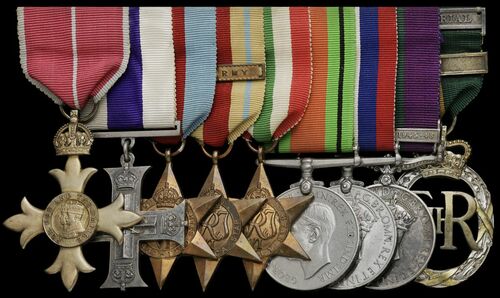
Auction: 23001 - Orders, Decorations and Medals
Lot: 382
A 1960 O.B.E. and Italy 1945 M.C. group of nine awarded to Colonel W. W. McHarg, Royal Artillery, who latterly went on to become 'Mr Scottish Racing'
The Most Excellent Order of the British Empire, Military Division, (O.B.E.) Officer's 2nd Type breast Badge, silver-gilt; Military Cross, G.VI.R., the reverse officially dated '1945'; 1939-45 Star; Africa Star, clasp, 1st Army; Italy Star: Defence and War Medals 1939-45; General Service 1918-62, 1 clasp, Palestine 1945-48 (Capt. W. W. McHarg. M.C. R.A.); Efficiency Decoration, Territorial, E.II.R., the reverse officially dated '1952', with Additional Service Bar, the reverse officially dated '1958', top riband bar adapted for mounting, mounted as worn by Spink & Son, good very fine, in card box (9)
O.B.E. London Gazette 11 June 1960. The Recommendation states:
'Lieutenant Colonel McHarg holds a Territorial Army Commission. He was appointed Commanding Officer 279 (Ayrshire) Field Regiment RA (TA) on 1 June 1957. His tenure of command is due to expire in May 1960.
During this tenure of command and more particularly during the last year, he has proved to be an outstanding and inspiring leader. He has the ability, through his qualities of devotion to duty, quiet confidence and leadership, of getting the best out of his subordinates. In addition, as a Territorial officer, he has an above average military knowledge, and an excellent knowledge of his Regiment and its functions in the wider sphere and how it fits into the local Territorial picture.
These qualities, aided by his personal drive and initiative, have resulted in the volunteer all rank strength of his Regiment increasing from 171, when he took over command, to a figure of over 400. He has raised the volunteer recruiting strength of his Regiment from fourth to first place in the Divisional Artillery.
By his personal integrity, powers of leadership and persuasion and due to the very high respect with which he and his Regiment are held in the County of Ayrshire, the very great honour of the Freedom of the Royal Burgh of Troon was presented to the Regiment on 30 May 1959. In addition the Freedom of the Royal Burgh of Irvine was granted to one of the Batteries of his Regiment in August 1959.
These two very great honours bestowed on one Regiment in its Centenary year are, in great measure, the result of the exceptional value of Lieutenant Colonel McHarg's recent service which, despite the fact that he has wide interests in his civilian life, have resulted in the most valuable contribution to the Territorial Army.'
M.C. London Gazette 28 June 1945. The original Recommendation states:
'During October 1944, 324 Anti-Tank Battery was supporting 12 Infantry Brigade in the forming of a bridgehead across the River Savio. Only one arc bridge was in position and a few tanks had crossed. It became essential to put 6-pounders into action on the far side of the river. In attempting this the Battery Commander and one Troop Commander were killed. Captain McHarg assumed command, and undeterred by the very heavy fire coming down on the river personally reconoitred a crossing and put the necessary guns in action. Two days later a Troop Commander reported that he was unable to move a 6-pounder up to an exposed position to support the infantry, Captain McHarg then went forward and personally drove the tractor down a road covered by Spandau fire and placed the gun in action in the FDL's.
Throughout this period when the Battery had suffered the loss of three of its Officers, Captain McHarg's determination and unfailing courage were a magnificent example and inspiration to all ranks of the Battery.'
William Wilson McHarg was born in Scotland in 1919, the son of the Clerk of the Racecourse at Bogside. Young McHarg read law at Glasgow University before the outbreak of the Second World War.
Commissioned into the Royal Artillery as a 2nd Lieutenant on 19 November 1940, he was made a Battery Captain by July 1943 with 324 Anti-Tank Battery and served with them having been returned from hospital on 31 July 1943. Sharing in the Italy campaign, McHarg had his Jeep blown up and the Driver killed on 14 September 1944 at Misano before winning his M.C. at Cesena on 21 October 1944.
Remaining in the Territorial Army upon the cessation of hostilities, McHarg resumed his law studies and began to work for his father's firm, which handled many racecourse contracts. His E.D. & clasp would follow, with an O.B.E. further adding to his laurels before he retired as Colonel in May 1963. He would continue his 40-year involvement with the Scottish racing industry and was instrumental in its development and success. He managed six racetracks and was the man who decided to move the Scottish Grand National to Ayr, besides levelling the playing field for the racing of Scottish horses, who were unfairly disadvantaged compared to English and Irish horses by the Handicapper on a previous system. A Deputy-Lieutenant for Ayrshire and Arran, the Colonel died at Ayr on 5 March 1994; sold together with copied research.
Subject to 20% VAT on Buyer’s Premium. For more information please view Terms and Conditions for Buyers.
Sold for
£1,300
Starting price
£1100




